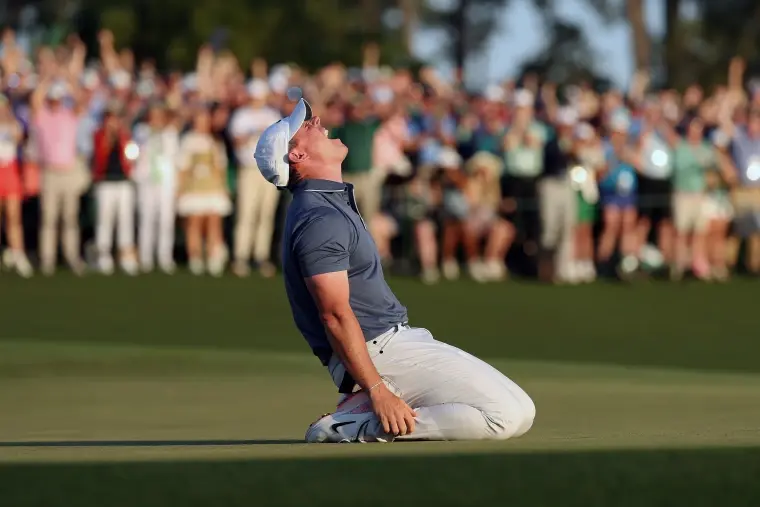Rory McIlroy and the Faustian bargain of professional sports
- Max Erisey

- Apr 15, 2025
- 4 min read
Updated: Aug 16, 2025
The golfer's emotional triumph embodies everything we love – and hate – about sports.

Last week at Augusta, Rory McIlroy ended one of the most agonizing droughts in sports history by narrowly winning the Masters and taking home his first green jacket, completing the revered “career grand slam” in the process. His talent hadn’t gone anywhere – in fact, he’s probably a better golfer now than he ever was in the 2010s – but it had been over a decade since the five-time major winner had last added to that tally, and he was starting to become defined by his losses just as much, if not more so, than his wins.
So is the ultimate drama of sports. That deal-with-the-devil environment in which one player’s glory is another’s lifelong torment. It’s easy to play the “they make millions of dollars so suck it up” card – and sure, that’s valid – but it’s even easier to take for granted the incredibly compromising positions these athletes put themselves in on a regular basis. And nobody encapsulates that more than Rory McIlroy.
Trophy drought aside, Rory’s golfing trauma dates all the way back to 2011, when he was the final-day leader at Augusta only to blow up and finish outside of the top ten. The years went on and Rory won just about every other tournament under the sun, but the scars of that fateful Sunday remained – and slowly came to define him. In the years between his 2014 PGA Championship win and the 2025 Masters, McIlroy had twenty-one top-ten finishes at major tournaments without a victory. And after every single one, that mental block grows just a little tighter, that feeling of “will I ever win again?” sets in a bit deeper. (An interesting part of this dynamic is that so many golfers would gladly settle for one top-ten finish at a major, let alone twenty-one.)
The crescendo of Rory’s tragedy came in the 2024 US Open, when he squandered a lead to Bryson DeChambeau after missing near-automatic putts on the 16th and 18th greens. Last Sunday, then, when Rory stepped up to the first tee with a two-stroke lead over who else but DeChambeau, there was an overwhelming sense of dread that what happened last year was bracing to repeat itself.
It's hard to describe the full range of emotions that come with a situation such as Rory’s, even for a spectator. Everybody wanted him to win, and everybody was so utterly terrified he was going to find a way to lose, that the final round of the 2025 Masters will go down as one of the most surreal and memorable viewing experiences in recent sports memory.
To say the round was a roller coaster would be the understatement of the century. Rory’s lead evaporated after a double-bogey on the first hole, then Bryson took a quick advantage after a birdie on the second. I imagine a good chunk of people turned off their televisions right then and there out of sheer anxiety, and I can’t blame them. But great players are great for a reason, and Rory found a way to bounce back and reclaim his lead heading onto the back nine. Then he hit the worst shot of his life and started to collapse, just as Justin Rose began surging up the leaderboards. Then he hit not one, but two of the greatest shots of his life and miraculously bounced back yet again. Throw in an 18th hole choke-job followed by a once-in-a-lifetime reset in the playoffs, and it makes for the most mind-bending, up-and-down round of golf ever played.
The defining moment of the night was the winning putt, where millions of people saw the weight of the world lift off one man’s shoulders in an instant. But the more interesting moment, I would argue, came after Rory missed the would-be winner on the 18th hole, and you could visibly see his stomach drop in real time. Had he have lost, it would have loomed as one of the most tragic and unwatchable clips in sports history, ominously punctuated by Jim Nantz’s words right before the putt: “Can you do it? How badly do you want it? All of these moments leading to this…” It would have been the summation of all that had gone wrong across his career, and likely the representative moment to haunt him for time immemorial.
Instead, the missed putt on 18 will contribute even further to the now-cemented mythos of Rory McIlroy – all-time great – and will be something he can laugh off at dinner for the rest of his life.
Lost in the shuffle of these era-defining stories are people like Justin Rose, who has quietly carved out his own contrasting legacy of triumph and heartbreak. He won the US Open in 2013 but has now tallied five second-place finishes at major tournaments, two of them being playoff losses at the Masters. Oddly enough, he would have been the villain had he won either of those tournaments. 2017 saw Sergio Garcia win his long-awaited major, and we obviously know the story with Rory.
For every Tiger Woods, there are ten Mito Pereiras – talented players who, tragically, will be defined by their failures rather than their successes. But that’s the game. Let’s just be happy Rory McIlroy won’t be chief among them.


Comments